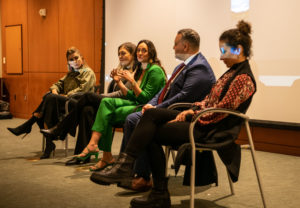This post was updated April 29 at 10:56 p.m.
Dr. Natalia Ramos, the medical director of UCLA’s Stress, Trauma and Resilience Clinic, sat down with Daily Bruin contributor Donya Hassanshahi during National Stress Month to discuss the significance of prioritizing mental and physical well-being, managing stress and sleep.
Ramos, who has practiced medicine for nearly ten years, received her medical degree from the University of Southern California, as well as her master’s from the Harvard T.H. Chan School of Public Health. Ramos, an assistant clinical professor of psychiatry at the David Geffen School of Medicine, said she has been at UCLA since her psychiatry residency.
This interview has been edited for length and clarity.
Daily Bruin: What made you interested in raising awareness for mental health through psychiatry as you work with patients?
Natalia Ramos: Health care and medicine often falls short in terms of not really focusing or kind of dealing with life stressors and different barriers and access to care and things that actually directly affect our health. It’s really hard to have healthy behaviors and good physical health without addressing and taking care of all the mental health and relationship kind of stuff. That’s where my interest was piqued, and over the years, (I) increasingly learned to appreciate the role of mental well-being if we want to achieve good physical well-being.
DB: What are some ways the UCLA community – students, faculty, families, etc. – could spread awareness about mental health during National Stress Month and physical outlets for coping mechanisms?
NR: There’s a lot we can do for ourselves and for each other. This fairly centralized community here, and community in itself is great for stress and mental well-being. A few concrete things come to mind, like checking in with people you love and care about, creating spaces for people to hang out and check in and talk. Some people like activity-driven time, so just meeting up with a friend for whatever – coffee, tennis, the gym, an art project – whatever floats your boat.
I think of coping with stress in a few different categories. I think about physical movement or exercise. I think about relaxation strategies – things we can do to unwind or separate from the stress, or sort of regain control of our physiology when we’re really hyped up. I think distraction strategies also work really well for a lot of us. So having little outlets, whether it’s funny videos online or your favorite show that you’re going to catch up with or a silly hobby that you’re developing in your free time.
DB: How would you define stress, and do you think that feeling stress is good in moderation or do you think it’s all bad?
NR: Research basically shows us that everyone has individual thresholds for what is tolerable or good stress versus bad or toxic stress, so it’s hard to generalize.
Generally speaking, I would say stressors that are shorter-lived, not chronic and affect maybe one – but not all – areas of our lives are easier to tolerate and manage. Stressors that are pervasive or ongoing or interfere with our goals and values – things like schoolwork – are much more intense stressors that are a lot harder to manage adaptively. It really depends on the duration of the stressor, the type of the stressor and also what your support network around you looks like to buffer the stressor when you have it.
Stress in it of itself isn’t bad. It becomes toxic when it’s too much or goes on for too long. It can be a good thing.
DB: Are there any lifestyle changes, or day-to-day changes, like little things that people could implement to decrease or manage stress?
NR: It’s probably different for each of us, but I think, in general, getting outside, getting natural light, getting fresh air is great. Moving your body is great. There’s tons of science showing that any amount and any type of physical exercise is really good for mood and brain health and has a million other good health consequences.
Especially for students, sleep is a big theme. Protecting sleep as much as possible, trying to have consistent routines with bedtime, trying to get yourself to bed at a reasonable time and getting a solid at least eight hours of rest. It’s very hard to manage stress when we’re sleep-deprived. That’s one area I work on a lot with folks.
Substance use is another big one that comes up. What you’re putting in your body, when and why, is a big theme. Some substances can provide a lot of temporary relief but might increase stress later and in a rebound effect.
Consistent routines with meals and sleep and physical activity are all super helpful. I often remind students that your performance is also directly affected by your self-care.
DB: What are methods that people can use to limit or control stressful circumstances?
NR: We really haven’t talked about devices and media much, and we probably should include that here – it’s a super big factor. In general, having rules for yourself around screen time, like having a cut off time later in the day or just not doing the doomscrolling at bedtime. Access to phones brings a lot of activation and also a lot of input about news and world events and a lot of stressful things. One good concrete thing we can all work on is having a cutoff time where we put our device aside and let our brains wind down in different ways.
Another big thing is just trying to have some sort of routine each day, especially in the evening. It doesn’t have to be chaotic or complicated, but having a consistent routine to your day is also really good for our stress management.





Comments are closed.